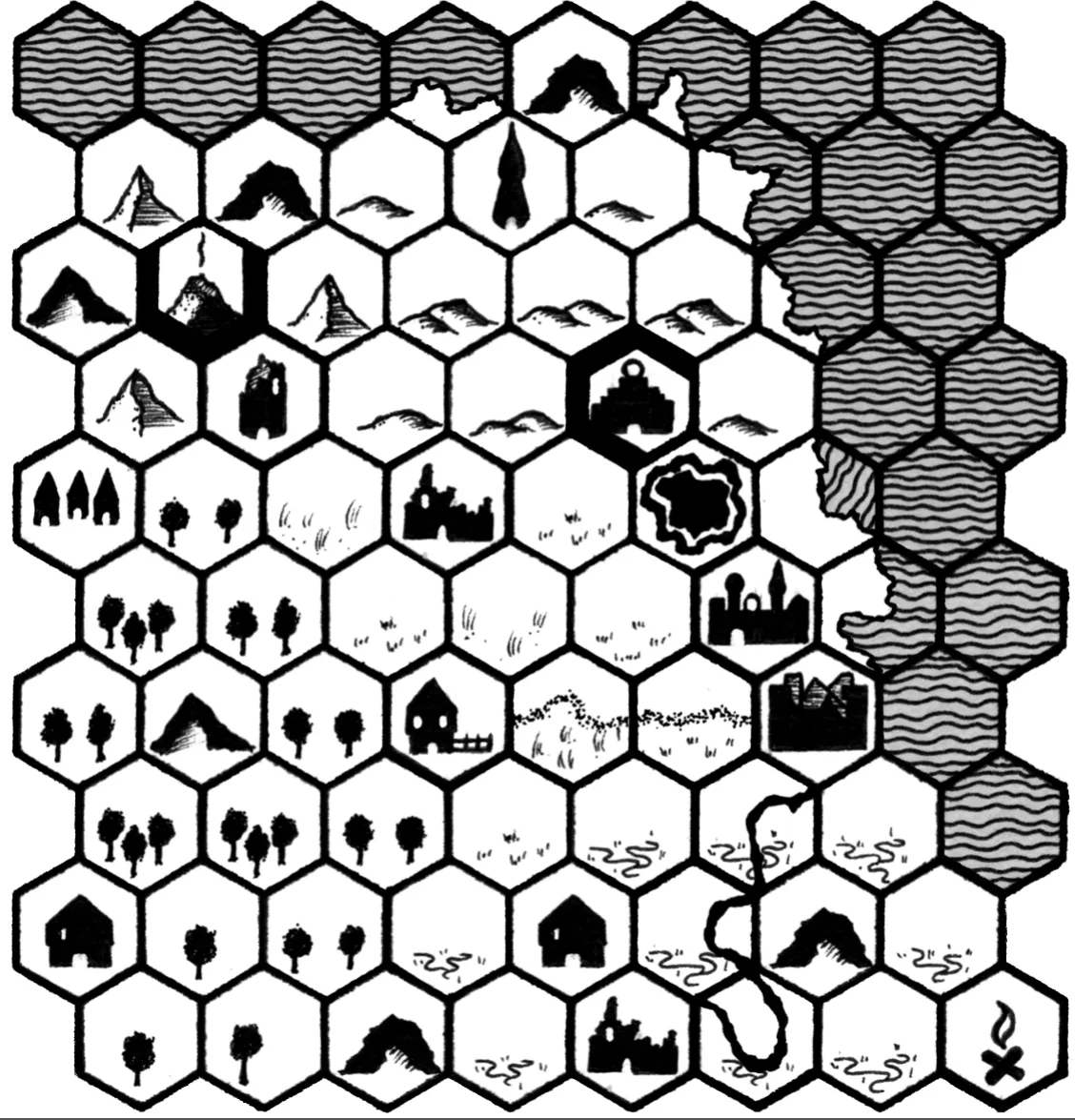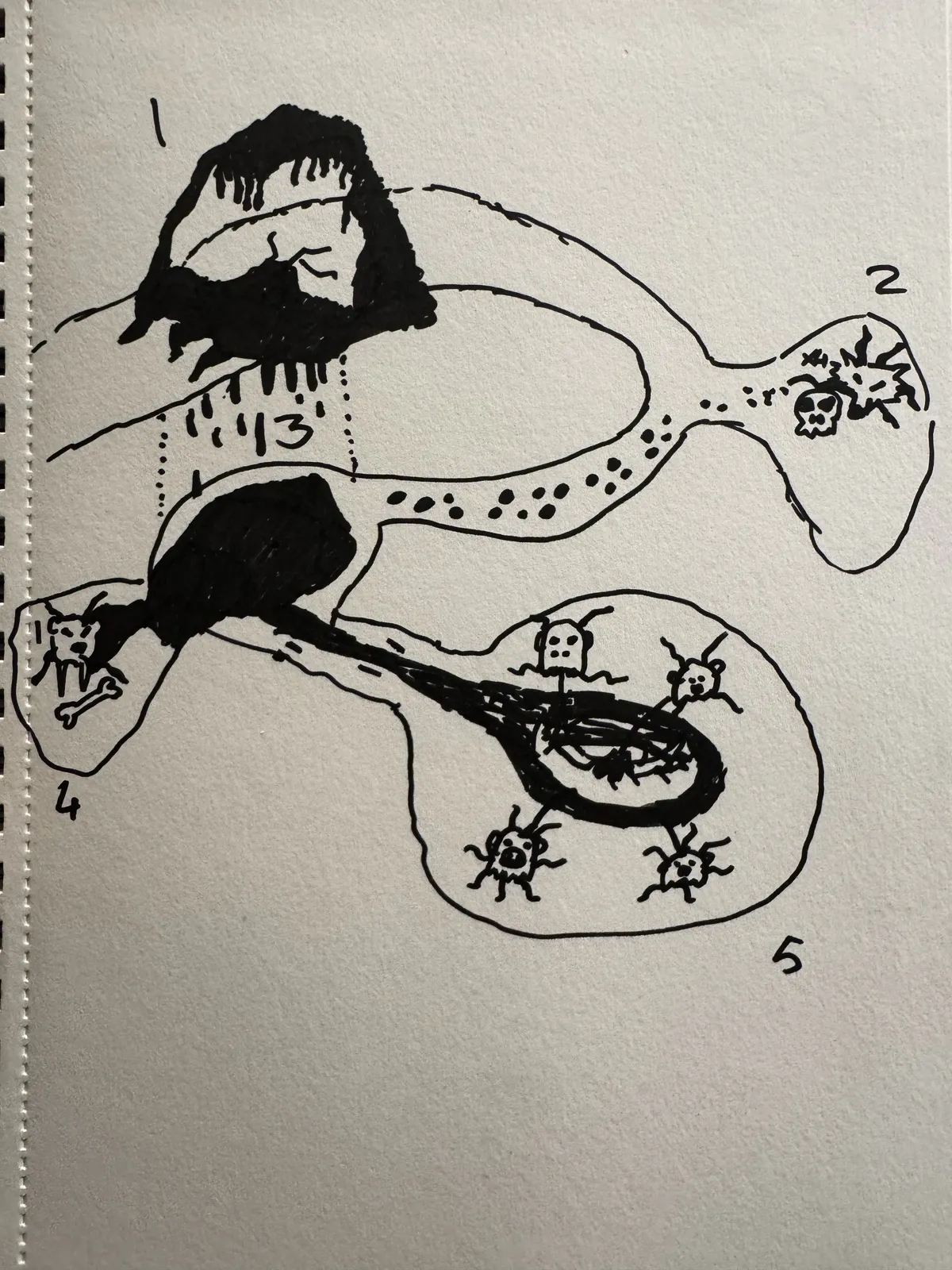How I prep for my weekly game
Let's jump on this bandwagon...
Prep is a scary word for me. Having gone to high-school in the UK, that word is forever ingrained as a synonym for homework. That's not a state of mind you want to be in when you prep for a game session. A lot of my journey as a new GM (about a year now) is how to actually make this part of the hobby fun.
 The Early Pitfalls:
The Early Pitfalls:
From the beginning, I always wanted to GM a sandbox. This was pure foolishness at the time, I acknowledge, but hey, we're still out here doing it so it can't have sucked that bad.
I quickly learned prepping a detailed open-world sandbox was a gargantuan task. Even prepping one adventure site on its own took me all week, especially since I was making my own VTT maps. How the hell was I supposed to do this for an open-world where players could go anywhere and do anything?
I really labored in those early days of campaign prep, spending almost all the free time I had trying to prep as much content as possible so the players never felt boxed in. It felt like a second job, and I already work a creatively demanding profession. Burnout was inevitable.
My table structure didn't help with this type of prep format. I didn't have an open-table per se, but we would constantly shuffle between a stable of players each session based on availabilities. Sessions would also usually run between 2-3 hours, because we all have lives outside of this, so most of the content I prepped got ignored entirely.
I don't care what your attitude is to GMing, but that feeling of prepping so much only for so little to matter stings. I took it in stride, but still,I wished we could have longer sessions. I wished we could just play in person instead of online. I wished my group could just be consistent. Honestly, I thought the hobby was not worth all the trouble I went through to get a game going.
How it got better:
The truth is, not much of the table structure had changed. I still play with mostly the same people. My sessions are still 2-3 hours long. The party is still a mishmash every week of different players. But we do play almost weekly, and we do have fun.
So what changed?
In short: I adapted to the needs of the table, and to my own needs as a GM.
One of the great benefits of running shorter sessions is you really don't have to prep that much in the grand scheme of things. In a sandbox format, having a few adventure sites scattered about a good day or two's journey from where the players are is enough to get you started.
Really, where the prep needs to focus is on providing dynamic elements for the sandbox to provide play through exploration. This does mean having regional encounter tables, but also, importantly, you need to flesh out local faction goals. You don't want to be in a position where players encounter a faction randomly, only to be utterly lost as to what they are even doing there.
When it comes to the rest of the world, starting with a loose outline of the farther locations and factions is fine. The way I've been doing it is to provide markers on my map for where these adventure sites might be and what they are, but not much more information beyond a short paragraph.
I will only flesh out the site in more detail when it becomes clear to me that the players are interested in going there, or if they are already so close to it that they may stumble upon it during play. The worry with this method is that the players surprise you and decide to go somewhere you haven't prepared. This is where you can just be honest about not being prepared and either improvise or just cut the session short.
In my experience, players will often end up where I expected them to, not because I railroaded them, but because I asked them before the end of last session what they wanted to do next session, and I went and prepped that. They are still free to take a different path, but the vast majority of the time they stick to their plan because they have clearly defined their goals.
It really helps to have their long term goals expressed early and to keep reiterating it during play. Nothing is set in stone, but having an open conversation about the players' goals for the campaign narrows down what you need to be prepping. If they have a change of heart, that's cool, but they should express it openly and clearly so you know what to do next.
Writing session reports is absolutely crucial for this. Re-reading the report of last session before I prep the next is my best tool for providing meaningful reactivity. The sandbox becomes a cascade of choice and consequence.
A lot of what you should be prepping session to session also comes down to understanding the rhythm of table-time. This can be influenced by the system, but mostly it's just a group dynamic thing. It took me a while to learn how much content my group will get through in an average session. So if I prepare just a bit more than that each week I am giving them more than enough for a satisfying game night.
In my current Mutant Crawl Classics campaign, I know that players will usually cross a couple of hexes and explore 2-3 rooms of a given dungeon per session. Session time usually gets taken up by roleplay, strategizing, and just catching up as IRL friends. If there is combat, even if it is short, it takes up a 3rd of our playtime. I really don't need to prep that many encounters.
Ok cool, but what about the tools?
For one, I've recently ditched virtual maps and instead choose to prep on index cards and my sketchpad using wet marker (big-up Runehammer!). I still play most of my games online so VTTs are a necessary evil, but I don't like being bogged down by their bells and whistles. I use Owlbear for this reason, since it's just a board I can drop tokens on, with some simple tools to help with gameplay. For most of my games I used to pull maps from the internet. Often very fancy ones. For NPC illustrations I would just use an LLM to generate an image (GASP!).
The problem was always that I would constantly juggle between my map, which was digital, and my notes, which were also digital, absorbing nothing in the process. Having a physical artifact of not just my notes, but my WORLD, does allow me to internalize information better. My doodles don't look as slick as the ChatGPT images, but they are undoubtedly mine. I just had to get over my own insecurities about showing them off. Yeah, I know they suck, but I'm inflicting them on my friends anyways.
What I'm starting to do more is bake my notes into the maps I draw, by including abstracted/simple visual icons that immediately register for me (I will at least have them keyed somewhere in my notes). So when I look at the map, I recall the notes I have for that area, and I can just run the game off that. These icons include enemy locations/numbers, notable features of a room, traps, and loot.

During play, I will port my map drawings onto the VTT. I actually don't care if players see my icons on the map. I don't play systems that use perception checks, and I am very generous with the information I give players. If that information is represented on the map, it makes sense that they would see it as soon as they enter that room, so no point in being coy.
At the end of the day I still port a lot of my notes into Obsidian, after handwriting them. I find it to be a very clean digital tool. But I am constantly inserting pictures I took of my physical notes and drawings to get them incorporated somehow.
The main things I like to note down beforehand is creature/faction information and stats. For example, knowing the stats of an Alien Symbiote before getting it to the table saves me the hassle of doing it on the fly. Having easy to reference notes on its goals and tactics makes running it simple and more consistent. I will also key the rooms using text just to have a backup in case I can't pull anything from the visuals, but I often don't reference those notes at the table.
The big thing I like Obsidian for is the ability to draw connections between different elements of my prep. Having that ability to jump around between linked files is very useful in a pinch. Not gonna lie though, I feel like I still prefer having the physical notes written somewhere, mainly because I need to reference them a lot less when I am actually playing.
Overall this is not the most efficient way to prep, but I do find it to be more personally rewarding. GM-ing is a creative outlet for me. So ultimately the biggest thing that affects how much I prep is how inspired I am feeling. Some weeks I do feel like I bit off more than I can chew, other weeks are a breeze. But I still get whatever I can to the table each Saturday.
Ultimately, letting go of perfection is what gets me feeling less anxious about it all. Sometimes my ideas work, sometimes they don't. I'm at least doing the work to build on each session week to week and my players are mostly vibing with it and so am I. I'm here to have fun with my friends, and I am ok with treating this just as a game. It's how I get value out of my hobby.